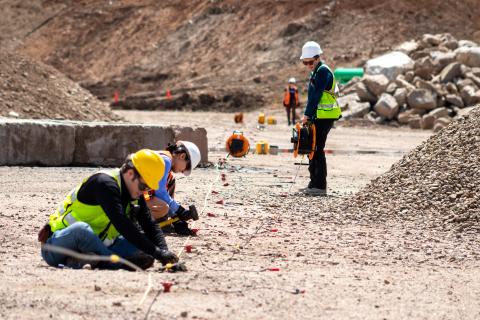All Categories
Featured
Table of Contents
What Is The Difference Between Geophysical Method And ... in Seville Grove WA 2022
This work is increasingly contracted out, so consultancies provide another source of employment. Consultancy firms differ in size, from extremely little companies to large multinationals. Some consultancies are rather specialised in utilizing specific geophysical techniques or working in particular places, while others provide a more diverse variety of services to their consumers.
The extraction of gas from land fill websites is another area of employment and this might grow in the future. Exploration business might carry out work for construction companies, water business, mining companies and ecological companies, so geophysicists may be employed in any of these settings. Other employers include: geological surveysgovernment bodies and agenciesuniversities and research institutes.


Vacancies may be listed in the oil and gas sector press. Recruitment is impacted by oil cost fluctuations and the level of competition for positions differs depending upon this. Professions Days, which cover the complete variety of geoscience professions and are usually attended by a number of crucial market companies, are run by The Geological Society.
Working As A Geophysicist And Oceanographer In Canada in Alfred Cove Western Australia 2020
Some of the large oil and gas companies use a complete two-year structured training program throughout the breadth of geophysics, consisting of the chance to experience work in various teams before specialising in one area. Your training may consist of deal with: existing wellsmagnetic and gravitational prospective field information analysisresearchrock analysis. It's more usual for your preliminary training to be offered on the task.

There may be a probationary period during which you work together with a skilled coworker. Competency-based appraisals occur routinely in many companies. In smaller sized companies, and for academic posts, there is not likely to be any formal training - you'll be expected to begin work straightaway and pick up abilities as you go along.
If you work for a smaller sized business, you may find that you require to take obligation for arranging and funding your own advancement and training. If you have a geology degree, membership of The Geological Society can be useful for networking and for maintaining to date with the market.
Geophysicist - Job Role - Job Information in Clarkson Western Australia 2020
You may also discover it useful to sign up with the PESGB (The Petroleum Expedition Society of Great Britain, which has a geophysics special interest group. After a probationary period, and once you have actually gained some experience, you might advance to senior geophysicist, then group leader and then into a senior function in management.
The ease of movement between functions depends on the company structure. Study at Masters or Ph, D level in a subject related to geophysics or geosciences may assist with your career development and development. The work market within the oil and gas industry is extremely based on cost and this may affect your opportunities for career progression.
For skilled geophysicists, freelance consultancy provides an excellent path for career advancement. As a geophysicist, you're most likely to have a number of jobs throughout your working life.
Gravity Geophysical Survey Method in Samson WA 2022
From geophysics, it's possible to focus on seismology (completing additional training to end up being a seismic interpreter) or to move into associated locations such as engineering geology or risk prediction.
Choosing what to study in college is a difficult option. Even if you understand that your field of interest depends on science, what program of study is ideal for you? If you make the decision to significant in physical and biological sciences and pursue a profession as a geophysicist, you're getting ready for an amazing and rewarding occupation.
However the very first action to accomplishing your goal of becoming a geophysicist is earning a degree. Even for entry-level positions in the field of geoscience, you'll need a bachelor's degree (a geophysicist college degree) from an accredited college or university. Some research study positions require candidates to hold master's degrees or even Ph.
Where Can A Geophysicist Work Other Than The Oil Industry? in Bickley Aus 2023
Doctoral degrees are especially crucial if you plan to teach at a four-year organization. Geophysicists apply physics ideas and strategies to study the gravitational, magnetic, and electric fields of the earth. This advances researchers' understanding of both the planet's interior core and its surface. Geophysicists must have the ability to: evaluate rocks, pictures, and other pieces of data carry out research both in the field and in laboratories produce maps and charts of their findings write reports To accomplish all this, students need a specialized education for geophysicist professions.
As stated above, you'll need a bachelor's degree in geoscience or a related discipline, such as a physical science or a life sciences, to land an entry-level task. But students can also prepare by learning topics like: Biology Chemistry Computer technology Engineering Mathematics Physics The above geophysicist majors provide a more generalized approach to a single scientific discipline, however the majority of programs need students to take one or more geology course.
Latest Posts
Geophysical Surveys: Definition & Methods in Forrestdale Oz 2020
Geophysics in Spearwood Australia 2022
Geophysical Survey in Kinross Oz 2022